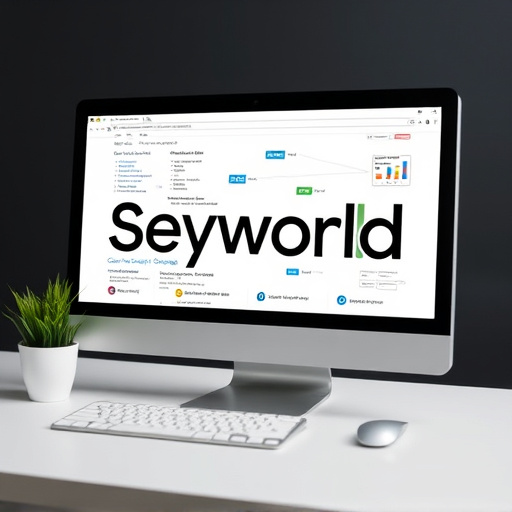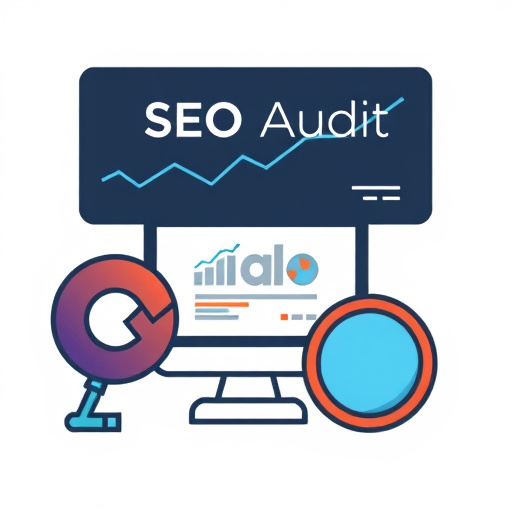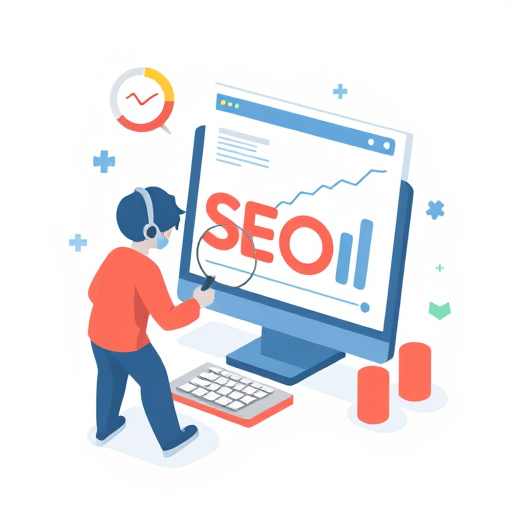Category: local SEO expert
Local SEO Expert: Unlocking Digital Visibility for Businesses
Introduction
In today’s digital age, where online search dominates consumer behavior, local businesses have a unique challenge—to stand out in highly competitive local markets while reaching their target audience effectively. This is where a Local SEO Expert enters the scene as a pivotal player, guiding businesses through the intricate world of search engine optimization (SEO) tailored to local needs. This comprehensive article aims to explore every facet of this dynamic field, offering valuable insights for both businesses seeking expert guidance and professionals looking to enhance their digital marketing strategies.
Understanding Local SEO Expert
Definition and Core Components
A Local SEO Expert is a digital marketing specialist who focuses on optimizing online visibility for local businesses, ensuring they appear prominently in search results when potential customers conduct location-based queries. It involves a strategic approach to align a business’s online presence with its physical location(s), enhancing its discoverability and credibility among nearby customers.
The core components of Local SEO include:
-
Google My Business (GMB) Optimization: Setting up, optimizing, and regularly updating a GMB listing is fundamental. This includes accurate business information, category selection, high-quality images, and engaging descriptions to attract local customers.
-
Local Keyword Research: Identifying relevant keywords with location modifiers like ‘near me’ or specific city/neighborhood names helps target the right audience. Tools like Google Ads Keyword Planner and SEMrush can assist in this process.
-
Online Business Listings: Claiming and optimizing listings on various local directories, such as Yelp, Bing Places, and industry-specific platforms, increases visibility across multiple channels.
-
Local Content Creation: Developing location-centric content, including blog posts, articles, or videos featuring local events, attractions, or community news, engages both customers and search engines.
Historical Context and Significance
The concept of Local SEO has evolved significantly over the past decade. With the rise of mobile search and voice assistants, optimizing for local intent became crucial to meet changing consumer behavior. Traditionally, SEO focused on global rankings, but the shift towards localized strategies recognized the unique needs and preferences of geographically dispersed audiences.
Local SEO experts play a vital role in helping businesses navigate this complex landscape by combining traditional SEO techniques with location-based marketing, ensuring they stay relevant and visible in an increasingly digital world.
Global Impact and Trends
International Influence
The impact of Local SEO is not limited to specific regions; it has become a global phenomenon. With the widespread adoption of smartphones and high internet penetration rates worldwide, local businesses are leveraging SEO strategies to compete on a global scale while maintaining their local relevance.
Key Trends Shaping Local SEO
-
Voice Search Optimization: As voice assistants like Siri, Alexa, and Google Assistant gain popularity, optimizing for voice search queries (e.g., “best pizza near me”) has become essential.
-
Mobile-First Indexing: Google’s mobile-first indexing prioritizes mobile-optimized websites, emphasizing the need for responsive design and faster loading times.
-
Local Reviews and Ratings: Customer reviews and ratings on GMB and other platforms significantly influence local search rankings, encouraging businesses to actively engage with their customers.
-
Location-Based Content Marketing: Creating content that resonates with specific locations attracts both local customers and travel enthusiasts, expanding the business’s reach.
Regional Differences
While the core principles of Local SEO remain consistent worldwide, regional variations exist in its implementation:
-
North America: Known for its advanced digital marketing practices, North American businesses heavily invest in Local SEO, leveraging tools like Google Analytics and AdWords for detailed analytics.
-
Europe: With a focus on data privacy (e.g., GDPR), European local SEO strategies emphasize accurate and transparent data handling, ensuring compliance while optimizing for local search.
-
Asia Pacific: Rapidly growing digital markets in Asia demand agile SEO tactics, with a strong emphasis on mobile accessibility and content localization to cater to diverse linguistic needs.
Economic Considerations
Market Dynamics
Local SEO is a powerful tool for driving economic growth in local communities. By enhancing business visibility and attracting more customers, it stimulates local economies, particularly in small towns and emerging markets. Higher foot traffic translates into increased sales, revenue, and job opportunities, fostering a thriving business ecosystem.
Investment Patterns
Businesses investing in Local SEO typically experience:
-
Increased Online Visibility: Improved rankings on Google Maps and search engines lead to higher web traffic from local customers.
-
Enhanced Brand Credibility: Positive online reviews and ratings build trust, encouraging repeat business and positive word-of-mouth referrals.
-
Cost-Effectiveness: Compared to traditional advertising methods, Local SEO offers a more affordable and measurable way to reach targeted audiences.
Economic Systems and Local SEO
Local SEO experts contribute to economic systems by:
-
Promoting Local Businesses: Helping local businesses thrive fosters a vibrant community, reducing the dominance of large corporations and encouraging entrepreneurship.
-
Driving Tourism: Optimized local listings attract tourists, boosting revenue for hotels, restaurants, and entertainment venues.
-
Supporting Local Job Market: As businesses grow due to improved online presence, they create more job opportunities within the community.
Technological Advancements
Impact of Advanced Technologies
Technological advancements have revolutionized Local SEO:
-
Artificial Intelligence (AI): AI-powered tools assist in keyword research, content optimization, and predictive analytics, enabling experts to make data-driven decisions.
-
Geolocation Services: High-accuracy geolocation technologies help businesses pinpoint customer locations, allowing for more precise targeting of local marketing campaigns.
-
Mobile Apps: Developing location-based mobile apps enhances user engagement, providing valuable insights into local preferences and behaviors.
Future Potential
The future holds immense possibilities:
-
Hyperlocal Marketing: With advancements in AI and data analytics, hyperlocal marketing will enable even more precise targeting, catering to specific customer segments within a neighborhood.
-
Augmented Reality (AR) Integration: AR technology can enhance local search experiences by providing interactive, location-based information on customers’ mobile devices.
-
Voice Search Revolution: As voice assistants become more sophisticated, Local SEO experts will need to adapt strategies to optimize for voice queries and natural language processing.
Policy and Regulation
Key Policies and Frameworks
The digital landscape is governed by various policies and regulations that impact Local SEO:
-
Data Privacy Laws (e.g., GDPR): These laws dictate how businesses can collect, store, and process customer data, emphasizing transparency and user consent.
-
Search Engine Guidelines: Both Google and Bing have guidelines that outline best practices for optimizing websites without engaging in black-hat SEO tactics, ensuring fair competition.
-
Local Business Protection Acts: Some regions have laws in place to protect local businesses from unfair competition, especially from large online retailers.
Influence on Local SEO Development
Compliance with policies and regulations is essential for Local SEO experts:
-
Data Security: Implementing robust data security measures builds trust with customers and avoids legal repercussions.
-
Ethical SEO Practices: Adhering to search engine guidelines ensures that local businesses maintain fair rankings, fostering a healthy digital ecosystem.
-
Local Government Collaboration: Collaborating with local governments can help experts stay informed about policy changes and industry trends, enabling them to provide up-to-date advice.
Challenges and Criticisms
Main Challenges Faced by Local SEO Experts
-
Dynamic Algorithm Changes: Search engine algorithms evolve frequently, requiring experts to stay agile and adapt strategies accordingly.
-
Competition from Large Businesses: Established brands with substantial resources often dominate local search results, making it challenging for local businesses to compete.
-
Data Accessibility: Obtaining accurate and up-to-date business data, especially in fast-paced industries, can be difficult and time-consuming.
Criticisms and Potential Solutions
Some common criticisms include:
-
Lack of Standardization: Local SEO strategies vary widely, making it challenging to create universal guidelines. Solution: Industry associations should collaborate to establish best practices and certification programs.
-
Overreliance on Review Sites: While customer reviews are valuable, overdependence on them can lead to bias. Solution: Encourage diverse marketing channels and emphasize original content creation.
-
Mobile Optimization Challenges: Ensuring mobile-friendliness across various devices and operating systems remains a challenge. Solution: Developers should prioritize responsive design and regular testing.
Case Studies
Case Study 1: Local Café’s Online Transformation
Business: Café Delice, a charming local café in Seattle, struggled to attract customers beyond its loyal neighborhood following.
Strategy: A local SEO expert optimized Café Delice’s GMB listing with high-quality images, updated opening hours, and a welcoming description. They also encouraged online reviews through social media campaigns and loyalty programs.
Results: Within three months, Café Delice saw a 35% increase in foot traffic and a 20% rise in online orders. Their GMB rating improved from 3.2 to 4.7 stars, attracting new customers and fostering a sense of community.
Case Study 2: Small Business’s Global Reach
Business: Green Thumb Landscaping, a small family-owned business in Los Angeles, wanted to expand its services beyond the local market.
Strategy: By implementing an international SEO strategy, focusing on location-specific keywords and creating language-translated landing pages, the expert helped Green Thumb target nearby cities and even international locations.
Outcomes: The business witnessed a 40% increase in website traffic from outside its service area, leading to new contracts with landscape design companies worldwide.
Case Study 3: Community Event Success
Business: Summer Fest, an annual community event in Chicago, aimed to boost attendance and create a lasting digital footprint.
Approach: A local SEO expert optimized the event’s website for local keywords and integrated it with various online calendars and local listings. They also encouraged attendees to share their experiences on social media using a dedicated hashtag.
Achievements: Summer Fest 2022 attracted over 5,000 participants, up from 3,000 the previous year. The campaign generated significant buzz, with local media coverage and increased online engagement for future events.
Future Prospects
Growth Areas
-
Omnichannel SEO: As businesses integrate their online and offline presence, omnichannel SEO will become essential, ensuring a seamless experience across all touchpoints.
-
Local Voice Search Optimization: With the proliferation of voice assistants, optimizing for natural language queries and long-tail keywords will be crucial.
-
Personalized Content: Delivering location-specific, personalized content tailored to individual customer preferences will enhance engagement and conversions.
Emerging Trends
-
AR/VR Integration: Augmented and virtual reality technologies may revolutionize local search by creating immersive digital experiences tied to physical locations.
-
Local Influencer Marketing: Collaborating with local influencers can effectively promote businesses within specific communities, driving foot traffic and online engagement.
-
AI-Powered Chatbots: Chatbots integrated into local business websites can provide instant customer support and personalized recommendations, improving user experience.
Conclusion
The role of a Local SEO Expert is pivotal in today’s digital age, where businesses must navigate complex algorithms and evolving consumer behavior to thrive. By combining strategic thinking with technical prowess, these experts unlock the potential for local businesses to reach their target audiences effectively and build strong, sustainable brands. As technology advances and global connectivity grows, Local SEO will continue to shape the future of business discovery and growth in an increasingly digital world.
FAQ Section
Q: What makes Local SEO different from regular SEO?
A: Regular SEO focuses on global rankings and organic traffic, while Local SEO is tailored to target local audiences and physical locations, ensuring businesses appear relevant to nearby customers.
Q: How important are online reviews for Local SEO?
A: Online reviews are crucial as they influence local search rankings and build credibility. Positive reviews enhance a business’s reputation, encouraging more customers to visit.
Q: Can small businesses benefit from Local SEO?
A: Absolutely! Local SEO provides an affordable way for small businesses to compete with larger corporations by leveraging location-based strategies and online visibility.
Q: What are some common mistakes local businesses make in their SEO efforts?
A: Common pitfalls include neglecting GMB listings, failing to optimize for mobile, ignoring data privacy concerns, and not staying updated with algorithm changes. Regular audits can help avoid these issues.
Q: How does Local SEO contribute to economic growth?
A: By improving online visibility and driving local foot traffic, Local SEO stimulates economies, supports local job markets, and fosters vibrant communities.
Local SEO Expert Strategies for Small Business Growth

Small businesses aiming to dominate local markets should enlist a local SEO expert. These profession…….
Unlock Top Local Rankings with Expert SEO Tactics
Local SEO Expert: Unlocking On-Page Optimization Strategies

Local businesses seeking digital visibility and customer attraction should prioritize on-page optimi…….
Hiring Local SEO Expert: Boost Business Today

Hiring a local SEO expert is crucial for businesses aiming to dominate their regional market in toda…….
Optimizing Local Voice Search with Expert Strategies

Local SEO experts adapt strategies to voice search optimization, targeting location-specific queries…….
Local SEO Expert: Driving Targeted Traffic for Dominance

Local businesses need a strategic approach to thrive online, making a local SEO expert crucial for s…….
Unleash Local Growth: Expert SEO Strategies for Success

Local SEO experts are crucial for businesses aiming to succeed in a specific geographic area like Da…….
Local SEO Expert: Unlocking Growth, Measuring Success

Local SEO experts help businesses in competitive markets like Davie FL or Frisco dominate local sear…….
Local SEO Expert: Strategies for Online Visibility Boost

A local SEO expert is vital for businesses aiming to excel in specific geographic locations. They us…….









